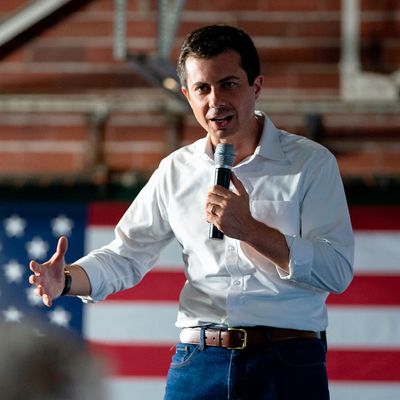
The increasingly strong possibility that the Senate will be holding an impeachment trial of Donald J. Trump at the same time the 2020 Democratic presidential nominating contest enters its voting phase is a big deal for certain candidates, as I noted last week:
[F]or six particular Democratic presidential candidates and their campaigns (Michael Bennet, Cory Booker, Kamala Harris, Amy Klobuchar, Bernie Sanders, and Elizabeth Warren), the possibility of a Senate impeachment trial occurring during the early stages of the caucus/primary season represents a potential calamity. And as the Washington Post reports, that’s a real possibility, particularly if the House drags its feet for reasons ranging from administration obstruction to the desire not to spoil the festive holiday spirit …
[I]f the House really doesn’t get its part done until well into December, you could easily see a trial running through the critical pre-Iowa stretch of frenzied activity. The Clinton trial, which was about as cut-and-dried as any presidential impeachment trial could be, lasted from January 7 until February 12, 1999. Let’s say for the sake of argument a Trump trial begins and ends precisely on those dates in 2020. It would encompass both the Iowa caucuses (February 3) and the New Hampshire primary (February 11). If it started later or ran longer, it could directly interfere with the Nevada caucuses (February 22), the South Carolina primary (February 29), or — worst-case scenario — the 12 states (including California and Texas) holding primaries or caucuses on Super Tuesday (March 3).
While an impeachment trial might well represent a disadvantage for senators running for president (especially if Mitch McConnell keeps the trial in session not only the six days a week required by Senate rules, but extends it into many evenings), it could give others an advantage on the campaign trail — particularly those whose only current gig is running for president. That would include among the currently visible candidates Joe Biden, Julián Castro, Tom Steyer, Marianne Williamson, and Andrew Yang. Some of them, of course, may not be in the race when voters head to the polls.
Another candidate who is likely to stick around will soon join their ranks. It didn’t get much attention, but Pete Buttigieg did not run for a third term as mayor of South Bend (he will be succeeded on January 1 by his former chief of staff, James Mueller). So technically speaking, Mayor Pete is about to become ex-Mayor Pete. And he will be able not only to focus obsessively on early-state campaigning when the new year is rung in, but can also more or less wash his hands of troublesome events in South Bend (especially the ever-simmering crisis in police-community relations).
There are other candidates holding elected offices that do not require attending an impeachment trial, including House members John Delaney and Tulsi Gabbard and Governor Steve Bullock. But you have to figure Biden and Buttigieg are the most likely beneficiaries of the mandatory distraction of their senatorial rivals. And in close early-state races, that could matter a lot.






























